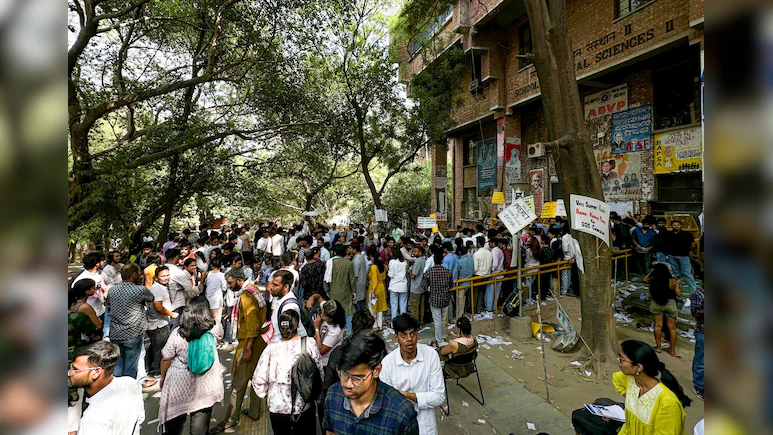ABVP (Akhil Bharatiya Vidyarthi Parishad) has written a historic page in the Jawaharlal Nehru University (JNU) Students’ Union elections by becoming the strongest force. Securing 23 of the 42 counselor seats in 16 schools and several special centers, ABVP has won the maximum number of seats among all student bodies, indicating a dramatic political change within the historically Left-oriented campus.
The thunderous victory by ABVP marks an important deviation from JNU’s traditional political tendencies. With strong wins in primary schools and centers, such as total domination over the School of Engineering and the School of Sanskrit and Indic Studies, ABVP has set its roots strongly.
Dominant Performance Across JNU Schools and Centers
ABVP demonstrated its power in different academic faculties. In the School of International Studies, it won 2 out of 5 seats, and in the School of Social Sciences—a traditional Left stronghold—it won 2 out of 5 seats, breaking a 25-year dry spell. The organization won 1 of 2 seats in the School of Biotechnology, and pulled off a sweep in the Special Center for Molecular Medicine by winning its single seat.
The wins didn’t stop, with ABVP winning 1 seat out of 2 in the School of Computational and Integrative Sciences and 2 seats out of 3 in the School of Computer and Systems Sciences. The most outstanding achievement was to sweep all 4 seats in the School of Engineering, illustrating ABVP‘s increasing popularity with science and technology students.
At the Special Center for Nanoscience, the School of Sanskrit and Indic Studies, and the Amalgamated Centers, ABVP scored 100% success, sweeping all available seats. In addition, ABVP won 1 seat in the School of Environmental Sciences, 1 seat in the Atal Bihari Vajpayee School of Management and Entrepreneurship, and 2 out of 3 seats in the School of Physical Sciences.

Unopposed Triumphs and Central Panel Wins
The dominance of ABVP was apparent even from the very beginning of the elections, as a number of candidates won uncontested. Surendra Bishnoi (School of Biotechnology), Praveen Piyush, Raja Babu, and Prachi Jaiswal (School of Sanskrit and Indic Studies), and Govardhan Singh (Special Center for Molecular Medicine) were all elected unopposed, yet again showing ABVP‘s popularity.
Adding to this triumph, ABVP contestants maintained consistent leads in the race for the top four central panel positions. Shikha Swaraj (President), Nittu Gautam (Vice President), Kunal Rai (General Secretary), and Vaibhav Meena (Joint Secretary) were constantly ahead of their respective contests, showing great support all over the JNU campus.
ABVP’s Historic Breakthrough in Left-Dominated Schools
The results of ABVP in strongholds of the traditional Left are particularly noteworthy. Securing two seats within the School of Social Sciences and the School of International Studies is an indicator of how far ABVP has come, as both these departments have long been regarded as ideological strongholds of Left-wing groups for decades.
By breaking these bastions, ABVP not only increased its electoral base but also proved its increasing acceptance among students who were hitherto aligned with other ideologies. This transformation indicates a wider political realignment in the university.
What does ABVP’s success mean for JNU politics?
The question arises: What does ABVP’s success mean for the future of JNU politics? Experts believe that this victory could mark the beginning of a new political narrative at JNU, where a more pluralistic ideological representation may emerge. ABVP leaders have framed the outcome as a triumph for nationalism, academic excellence, and student welfare, pledging to continue their efforts toward campus development.
Statements from ABVP Leadership
Rajeshwar Kant Dubey, ABVP JNU unit President, highlighted the scale of the success. “With 23 out of 42 wins in the JNUSU Council, ABVP has made history and won a majority that will enable us to take a central role in the council’s decision-making process,” he said. Dubey also characterized the victory as a “breach into the fortress of Left ideology,” adding that ABVP‘s ascendancy heralds a sea change of improvement embraced by the students of JNU.
He reaffirmed ABVP‘s resolve to “convert the campus into a laboratory for nation-building,” stating that the organization would continue to be committed to the twin objectives of academic excellence and student welfare. Thanking the students of JNU, Dubey appreciated everyone who helped create what he referred to as the “wave of change” in the university.
Broader Implications and Future Roadmap
ABVP leaders have expressed a vision of the future after their success. They want to promote a campus culture in which innovation, scholarly research, and nationalism exist in harmony. The organization is set to initiate new programs on research assistance, entrepreneurship skills, and more involvement of students in policymaking.
This election is a watershed moment for ABVP as well as for the overall ideological landscape of JNU. Observers indicate that the outcome may lead to similar changes in other universities, where Leftist control has historically been the order of the day.
The emphatic victory of ABVP in the JNU Students’ Union elections is more than a mere election win. It is a change in political dynamics at one of India’s greatest universities. In securing the trust of students from a wide range of disciplines, ABVP has laid the foundation for a new chapter in campus politics—one of academic seriousness, nationalism, and entrepreneurial student welfare.
With the newly elected counselors and panel leaders all set to take office, everyone will be looking at ABVP to see how well it can convert its electoral mandate into concrete action that is of benefit to the student body. The winds of change have indeed begun blowing at JNU—and ABVP is riding high on their wave.
ALSO READ
RTE Act Violation Triggers Uproar as Students Held Back in Classes 6 and 7
Madrasa Education Reform in Uttar Pradesh
Pingback: How Delhi schools are cleaning up Yamuna water now -